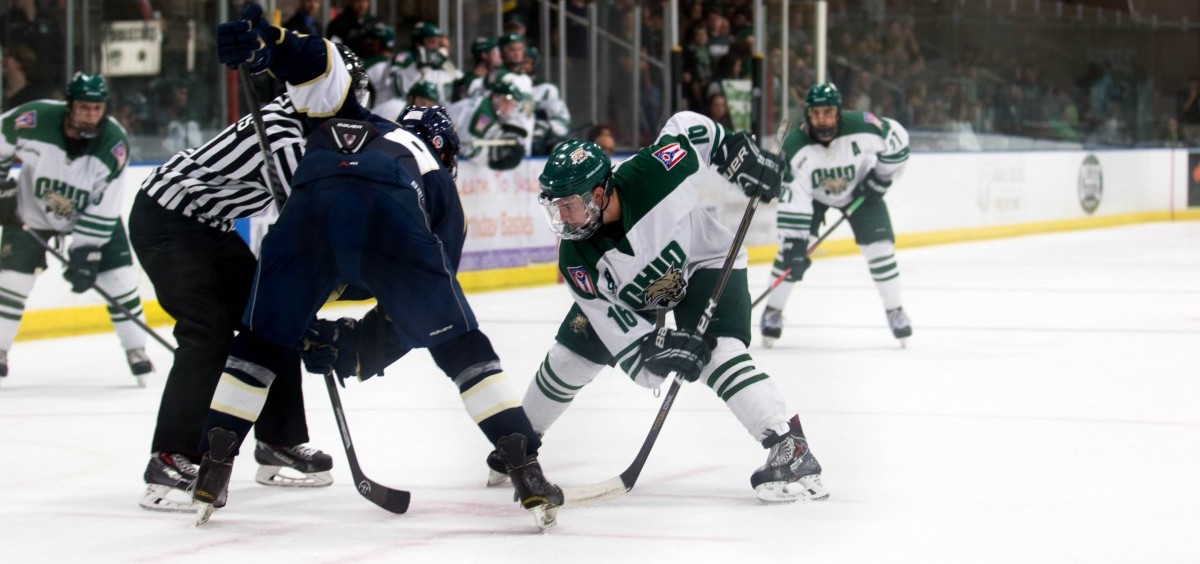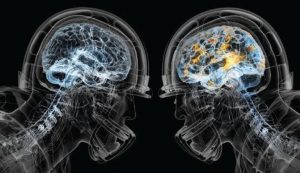
Concussions and their Impact on an Athlete’s Mental Health
By: Kellyanne StittsBy: Chelsea Sick
Posted on:

It happens all too often, an athlete has to stop playing the game they love because of a career ending concussion. For some, the concussion can cause more than a headache, or time spent on the sidelines, it can lead to mental health issues.
Ohio University’s Team Physician, Fred Soliman, says concussions can happen to anyone, but are most common among athletes who play contact sports. He compares a concussion to the inside of a broken cellphone.
“So, the simplest way I can put it is, you can take your cellphone and drop it, and you may not crack the screen but you have damaged the phone inside,” Dr. Soliman says. “So think of it like that, is that the hardware has been damaged and it can’t carry out it’s executive functions.”
Many athletes may not have visible injuries to their head or neck, but that does not mean they are free of a brain injury.
One Hard Hit Hung up the Skates
Matt Wipper understands this harsh reality. One hard hit, ended his 16-year hockey career while he was playing for Ohio University’s Hockey Team.

“I remember just being on the ice and then I remember our trainers hand on my back and kind of like tending to me, I have no idea how long I was out there,” Wipper said. “So she took me to the bench right after but I don’t remember that at all. I kind of remember being on the ice and having a wow moment, like ‘Oh god this is bad’. That is all I really remember.”
Matt told his team on team picture day he would no longer be able to play hockey because of the concussion. Although Matt continued to go to games and practices to support his teammates, he felt depressed and anxious about how he would fill his time without hockey.
“It’s hard cause it’s what defines you for like a lot of your life, you know I came here every single day, went to workouts, I was with the team every single day, bus rides, everything, then you just kind of stop that, so it’s a life shift,” Matt says.
Now, after two years without hockey playing a main role in his life, Matt has learned how to fill his time with other things, like academics and reading.
Ohio University Focus on Mental Health of Student Athletes
Ohio University’s athletic department follows the NCAA’s strict concussion protocol to ensure player safety. Assistant athletic director for sports medicine, John Bowman, says the staff makes mental health in athletes a priority as well.
“The NCAA community is feeling a need to create more mental health counselors for the student-athletes,” Bowman says. “They are under a lot of pressure. The pressure to do their academics, the pressure to do their athletics, to succeed at a competitive environment.”
Finding the right resources and providing athletes the help they need can be difficult.
“Institutionally we struggle with our staffing issues here, trying to find resources for that has not been easy, that’s something we’d like to work towards,” Bowman said.
New Technology To Determine Accurate Concussion Results
Many athletes take a baseline test before their sport season starts and then again after their season ends to determine if their brain is reacting to simple tasks the same way it did at the beginning of the season.
But Matt Wipper says it is common and easy for athletes like himself to memorize and fake the results of the baseline test.
“I’ve done those a lot, every team you go to you do a new one and every time I got a concussion I had to redo it, and even if I didn’t really have a concussion, I would have to do it,” Wipper said. “So I kind of joked with them right after, like I know all of this, I’ve memorized it. You do it so many times and you have to repeat the words and do all of that stuff, I know this. If you give me the test it’s not going to matter.”
Since the baseline test is not the most accurate portrayal of a person’s cognitive ability, there is a new technological device that delivers accurate, objective results.
The ClearEdge toolkit consists of three separate tests, a cognitive assessment, a balance assessment and a tracking questionnaire. Sports medicine physician, Dr. Aaron Roberts says this device takes away the subjectivity from both the patient and the physician.
“This technology, what it has allowed us to do is to have an objective view of a patient’s brain health and those different components that are involved in them,” Dr. Roberts says. “Symptoms like headaches and confusions and sleepiness and what not and also with cognitive functions”
As seen in the graphic above, Adena Health System is only one of two organizations in the state of Ohio utilizing the ClearEdge technology, and one of 10 in the nation.
In many cases the testing will be covered by insurance with no charge, however it all depends on the person’s insurance. Testing can also be done for free at one of their events.
Adena Health System Communications Manager Jason Gilham says, “We have also had multiple testing events where we offer the testing for free to assist in more student-athletes getting it done. Adena felt it was important to offer the service with no barriers of cost for parents and the kids.”
Gilham suggests calling ahead of time to work with people individually to best fit their needs.
To get a baseline test or a test after a concussion using the Clear Edge technology, contact the Adena Bone and Joint Center at 740-779-4598 or through email at concussion@adena.org. Testing is open to anyone.

